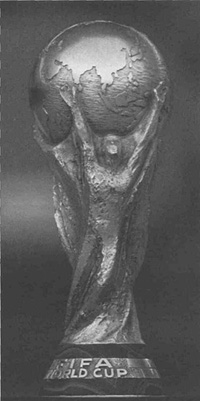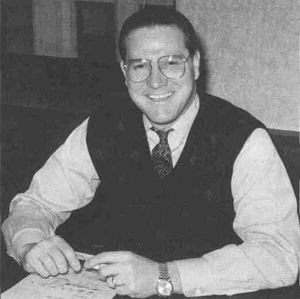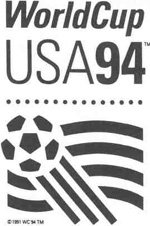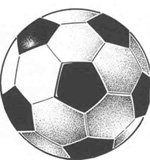 |
Home | Search | Browse | About IPO | Staff | Links |
|
March 1994/Illinois Issues/11 Chicago sports and business leaders are treating the World Cup events as an unprecedented opportunity for the Windy City to market itself to one-fifth of the world's population. "People don't yet understand the impact of this, but I think they will," says Dan Flynn, executive director of Chicago's World Cup office. Echoes Leslie Fox, director of the Chicago World Cup Host Committee, "This is the biggest event the city has ever hosted — and will host. People don't understand how big this is: the first time World Cup competition will be played on American soil will be in Chicago. That's big." Mayor Richard M. Daley categorizes the World Cup festivities as the city's most significant international event in its history because of the worldwide audience watching on television, the dignitaries and media attending the games, and the international fans visiting the city. A dozen heads of state (including President Clinton and German Chancellor Helmut Kohl) may be in Soldier Field, and about 1,500 journalists are expected to receive credentials as the festivities get under way. Between 60,000 and 150,000 international visitors will be in Chicago for World Cup events in June and July, generating an estimated $200 million economic bonanza for hotels, restaurants, retail outlets, the transportation industry and others catering to tourists. But even the $200 million may pale in significance compared to what could happen in Chicago because of the city's monthlong hospitality extravaganza: the influx of many more international vacationers in years to come and a new professional soccer team in the city. That means the city and state could see the benefits of this summer's events for a long time.
"This is so important for Chicago and Illinois," Mayor Daley says, explaining the total event as an opportunity for the city to expand on previous efforts to showcase itself as a major world city. Also, the soccer games themselves should "leave a legacy for soccer in America" and probably lead to the establishment of a new 12-team professional soccer league in the United States, according to Jim Froslid, press officer for the Chicago World Cup office. Soccer enthusiasts in the United States are well aware that passion
So while some discussions about the World Cup deal with athletic competition, many others focus on a much larger event that includes tourism, travel, economic gain and special events. The Illinois Bureau of Tourism is spending $3 million on public relations and advertising World Cup events. It has hired the Edelman and Hill & Knowlton public relations firms to prepare press kits for domestic media and foreign news bureaus, to set up fan tours and to perform other services. The Ogilvy & Mather ad agency produced a 30-second commercial "promoting Chicago as a fun, safe, dynamic place to visit," says Richard Blocki, marketing director of the tourism bureau. "People [overseas] think Chicago represents only Al Capone and Michael Jordan." The TV commercial was scheduled to run 55 times in February and March in several languages in European markets, especially London and Germany. No state advertising dollars are being spent in South America, Blocki said, because the number of visitors to Chicago from that continent remains low.
To put this marketing campaign into perspective, officials acknowledge that Chicago has hosted events almost as large in scope as the World Cup. The National Restaurant Association convention attracted 110,000 people, and the International Manufacturers Technology Show also drew more than 100,000 people. But no event like the World Cup ever has attracted so many international visitors in such a short span nor generated a worldwide television audience. "This is a mega-event," says
Arnold Karr, president of the Illinois Hotel-Motel Association. "What we have is an opportunity to showcase Chicago." Karr says Chicago gets only 3 percent of international travelers to the United States — far less than Washington, D.C., New York City, Las Vegas, Orlando and the California cities. "What you see now in Chicago is the international business traveler but not the leisure traveler. Do they [the international business people] come back with their families? That doesn't happen much." Chicago did have 1.93 million overseas visitors in
12/March 1994/Illinois Issues
International visitors will be in Chicago in part for the five soccer games scheduled at Soldier Field from June 17 through July 2 (see sidebar, "World Cup facts"). But to counter the Al Capone-Michael Jordan syndrome, numerous special events are planned for the thousands of visitors who will be in Chicago even though they don't have tickets to the games. One estimate is that for every international visitor with a ticket, three more will be in Chicago just for the excitement and passion generated by international soccer competition. Soldier Field can accommodate about 62,000 fans for each game. Among the special extracurricular events is a parade June 15, a Soccer Shopper's Weekend June 18-19, and the city's popular Taste of Chicago July 2-10 when visitors can savor the food of Chicago's best restaurants. The city also plans to show off its museums and other attractions. "A Tribute to Chicago Music," for example, will take place June 21 in the Museum of Science & Industry, where entertainers will play jazz, blues, gospel, country and Latin music. Another special evening is planned June 18 at the Art Institute, and on June 25, Chicago will show off its lakefront beauty with distinctive programs at the Adler Planetarium and Shedd Aquarium. Also that night will be the 37th Annual Venetian Night Parade of brightly lit boats honoring the teams playing in the World Cup, culminating with a fireworks display over Lake Michigan.
As Chicago puts its reputation on the line in the world's eyes, two major concerns of organizers are security and transportation. Security is the largest item in the budget, said press officer Jim Froslid. Heading the Security Committee in Chicago is Lee Flosi, a former FBI agent. He said more than 600 people will be working on security in the Chicago area — at the practice sites in the suburbs, at Soldier Field, at the hotels and other places where players and dignitaries will be. He noted that in light of the recent attacks on tennis star Monica Seles and skater Nancy Kerrigan and the terrorism against the Israelis at the Olympics in 1972, tight security at sporting events is nothing new — and is very important. But he conceded that soccer produces a unique potential for violence. Passion runs so high among soccer fans in Europe, for example, that fights sometimes occur. In Great Britain the term for this is "soccer hooliganism," which Flosi describes as spectators drinking and then stampeding and attacking opponents' fans. "Something triggers them and they go bananas," Flosi said. Soccer officials here openly expressed relief that England failed to qualify for the final round of World Cup competition in America this year. Alan Rothen-berg, chairman of World Cup USA, was quoted in the Toronto Sun last fall as feeling relieved the English did not make it. "The unfortunate attachment of thugs to English football would have caused a serious security task, our biggest concern," he said. "We would have had to worry every minute. Now all three countries we thought would have caused significant problems won't be there." He was also referring to Iraq and Iran, which were eliminated earlier.
From the Chicago World Cup office, Froslid said the absence of the English team has saved $1 million to $2 million
March 1994/Illinois Issues/13
in security costs in Chicago alone. A curious twist, of course, is that the Illinois Bureau of Tourism is zeroing in on London with its advertisements and encouraging English travelers to come to Chicago. Asked about the "hooligan" reputation among the English, marketing director Richard Blocki said the Illinois ads are primarily on British news and prime time programs — an appeal to "a more upscale audience" and not the thugs.
Meanwhile, a large team of law enforcement agencies has been working more than a year on World Cup security. Among those involved are the Chicago Police Department, FBI, various intelligence-gathering units, the Illinois State Police, the Olympic Committee, and the county sheriffs and municipal police departments in suburbs where teams will be staying and practicing. Terrance Gainer, director of the Illinois State Police, has canceled the vacations of most of his troopers from mid-June to early July so that he can add 200 officers to Chicago. He and Flosi agreed that intelligence gathering has been very important so they can deter the possibility of a terrorist attack or hooliganism. "We do not expect this [hooliganism] to occur here," Flosi says. While Gainer expects the State Police to play a significant role in crowd control and protection, he credits the Chicago Police Department as having one of the largest roles in security.
Flosi said some "innovative precautions" at Soldier Field for the five games already have been approved. Metal-detection wands will be used selectively at the gates, but it is too time consuming to require everyone to go through a metal detector. A list of unauthorized items includes anything that could become a projectile — flags with poles, cans and bottles. It's possible that alcohol will not be sold at all, Flosi said, although the final decision had not been made.
To help everything connected to World Cup go smoothly, the staff of 15 at Chicago's World Cup office has generated the assistance of 800 volunteers already, and that number is expected to grow to 2,000 by June. These volunteers will help in answering questions from the public, accrediting of media, handling security, transportation and accommodations, and helping everyone overcome
Transportation is an issue for the host committee as great as security is for the organizing committee. To make sure adequate transportation is in place the Chicago Transit Authority, the hotels, the Chicago Department of Transportation, the taxis and the host committee have been meeting for a long time. If all goes well, visitors will be able to focus on the soccer games and the events. If all goes really well, according to the organizers, Chicago will enjoy a significant increase in international visitors in years to come, and the nation will see the creation of a new professional soccer league — possibly with a team in Chicago — in 1995. The Chicago parade set for June 15 features many youth soccer players and will be shown on ABC, and all 52 World Cup matches will be on ESPN or ABC nationwide. "It can't help but spread exposure to the game," says Flynn. Just getting the World Cup competition to the United States was a dream come true for soccer buffs such as Flynn. An All-American soccer star at powerhouse St. Louis University in the 1970s, Flynn attended the World Cup in Mexico in 1970 and again in 1986. "I saw the passion and emotion and got caught up in it," Flynn says. "I was beside myself watching the German-Italian semifinal game. It's very hard to describe, but it hooked me well beyond my playing days." All 14 previous World Cup competitions since 1930 were staged in South America or Europe. Once the United States was awarded the 1994 games, the next step was to choose the venues, a process that involved intense competition among 32 cities. Mayor Daley, accompanied by Jay Pritzker, chairman of the Hyatt Corporation, presented Chicago's bid for the opening ceremonies. He was the only mayor to do so, and they got what they wanted. What they want now is for thousands of hours of planning and preparation to culminate in a wonderful experience, in and out of Soldier Field, at scores of activities built around 7 1/2 hours of soccer. 14/March 1994/Illinois Issues
|



